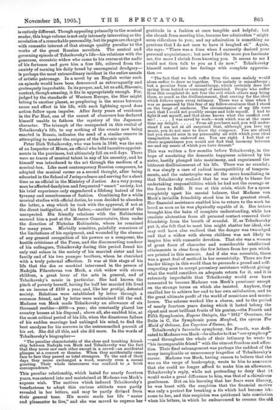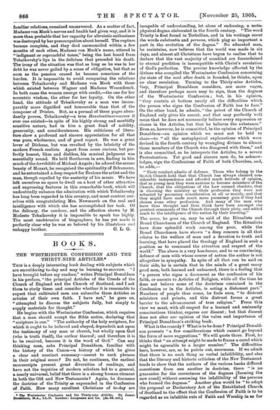years, was entered into and maintained at Madame von Meck's
express wish. The motives which induced Tchaikovsky's benefactress to adopt this curious attitude were partly revealed in her letters, and may be partly divined from their general tone. His music made her life "easier and pleasanter to live," and she was moved to express her
gratitude in a fashion at once tangible and helpful; but she shrank from meeting him, because her admiration "might seem ridiculous to you; and my admiration is something so precious that I do not care to have it laughed at." Again, she says : "There was a time when I earnestly desired your
personal acquaintance; but now I feel the more you fascinate me, the morel shrink from knowing you. It seems to me I could not then talk to you as I do now." Tchaikovsky himself entered into her feelings with complete apprecia- tion :—
"The fact that we both suffer from the same malady would alone suffice to draw us together. This malady is misanthropy ; but a peculiar form of misanthropy, which certainly does not spring from hatred or contempt of mankind. People who suffer from this complaint do not fear the evil which others may bring them, so much as the disillusionment, that craving for the ideal which follows upon every intimacy. There was a time when I was so possessed by this fear of my fellow-creatures that I stood on the verge of madness. The circumstances of my life were such that I could not possibly escape and hide myself. I had to fight it out myself, and God alone knows what the conflict cost me I I was saved by work—work which was at the same time my delight From all you have said, you will under- stand I am not at all surprised that, although you love my music, you do not care to know the composer. You are afraid lest you should miss in my personality all with which your ideal imagination has endowed me. You are right. I feel that or closer acquaintance you would not find that harmony between me and my music of which you have dreamt."
This was written a few months before Tchaikovsky, in the hope of emulating the domestic happiness achieved by his sister, hastily plunged into matrimony, and experienced the bitterest disillusionment of his life. There was no scandal ; it was simply a case of radical incompatibility of tempera- ments, and the catastrophe was all the more humiliating in
that Tchaikovsky realised that he was chiefly to blame for undertaking responsibilities which he had not the courage or the force to fulfil. It was at this crisis, which for a space completely upset his mental balance, that Madame von
Meck's invisible friendship stood him in the greatest stead. Her financial assistance enabled him to return to the work he loved as soon as he was physically capable of it. Her letters brought him the balm of complete understanding, while her resolute abstention from all personal contact removed their friendship from the breath of scandal. If, as Tchaikovsky put it, she felt that to meet him might shatter her ideal, she may well have also realised that the danger was two-edged and that a widow with eleven children was not likely to inspire him with romantic devotion. That she was a woman of great force of character and considerable intellectual attainments is clear from the few letters from her pen which are printed in this memoir. And if she was eccentric, there was a great deal of method in her eccentricity. There are few harder things in this world than to persuade a proud and self- respecting man to accept pecuniary assistance without giving what the world considers an adequate return for it, and it is extremely improbable that Tchaikovsky would ever have consented to become Madame von Meck's pensioner except on the strange terms on which she insisted. Anyhow, they enabled her to achieve her end to her own satisfaction, and to
the great ultimate profit of the world of musicians and music- lovers. The scheme worked like a charm, and to the period of nearly fourteen years during which it lasted belong the ripest and most brilliant fruits of his genius,—the Fourth and Fifth Symphonies, Eugene Oniegin, the " 1812 " Overture, the Suite in 0, the Symphonic poem Manfred, the operas The
Maid of Orleans, Les Caprices d'Oxane, &c.
Tchaikovsky's favourite symphony, the Fourth, was dedi- cated to Madame von Meck—he alludes to it as "our symphony" —and throughout the whole of their intimacy he wrote to "his incomparable friend" with the utmost freedom and affec- tion. Their final estrangement was perhaps the saddest of the many inexplicable or unnecessary tragedies of Tchaikovsky's career. Madame von Meek, having reason to believe that she was on the verge of bankruptcy, wrote to him to annaunce
that she could no longer afford to make him an allowance. Tchaikovsky's reply, while not pretending to deny- that it would make a great difference to him, was that of a chivalrous
gentleman. But on his learning that her fears were illusory, he was beset with the suspicion that the financial motive
was only a pretext for breaking a tie which had become irk- some:to her, and this suspicion was quickened into conviction when his letters, in which he endeavoured to resume the old familiar relations, remained unanswered. As a matter of fact, Madame von Meok's nerves and health had given way, and it is more than probable that her capacity for altruistic enthusiasm was destroyed by her preoccupation about herself. The rupture became complete, and they died unreconciled within a few months of each other, Madame von Meck's name, uttered in " indignant or reproachful tones," being the last heard from Tohaikovsky's lips in the delirium that preceded his death. The irony of the situation was that as long as he was in her debt he was never galled by a sense of obligation, but that as soon as the pension ceased he became conscious of the burden. It is impossible to avoid comparing the relations between Tchaikovsky and Madame von Meek with those which existed between Wagner and Madame Wesendonck. In both cases the women emerge with credit,—the one for her eccentric wisdom, the other for her loyalty. On the other hand, the attitude of Tchaikovsky as a man was incom- parably more dignified and honourable than that of the composer of Tristan. But, as a perusal of these pages abun- dantly proves, Tchaikovsky—a true Heautontimorumcnos if ever one existed—in spite of his highly strung and morbidly sensitive nature, had in him a great fund of nobility, generosity, and considerateness. His criticisms of litera- ture show a profound and sincere appreciation for all that was pure, wholesome, and of good report. He was a great lover of Dickens, but was revolted by the lubricity of the modern French realists. Apart from some curious, but per- fectly honest, likes and dislikes, his musical judgment was essentially sound. He held Beethoven in awe, finding in him much of the terribilita of Michael Angelo; he adored the serene beauty of Mozart, he recognised the spirituality of Schumann, and he entertained a deep respect for Brahma the artist and the man, though repelled by the austerity of his music. We have left ourselves no space to dwell on a host of other attractive and engrossing features in this remarkable book, which will undoubtedly enhance the admiration with which Tchaikovsky has long been regarded in this country, and must content our- selves with congratulating Mrs. Newmarch on the zeal and intelligence with which she has accomplished her task. Of the delicacy, the candour, and the affection shown by M. Modeste Tchaikovsky it is impossible to speak too highly. The most unobtrusive of biographers, he has yet made it perfectly clear why he was so beloved by his illustrious and
unhappy brother. C. L. G.
BOOKS.
THE WESTMINSTER CONFESSION AND THE THIRTY-NINE ARTICLES.* This is a deeply interesting book dealing with subjects which are smouldering to-day and may be burning to-morrow. "I have brought before my readers," writes Principal Donaldson in his preface, "the principal Articles of the Creeds of the Church of England and the Church of Scotland, and I ask them to study these and consider whether it is reasonable to expect that cultivated men can subscribe these Articles as articles of their own faith. I have not," he goes on, "attempted to discuss the subjects fully, but simply to supply materials for thought."
He begins with the Westminster Confession, which requires that a man should accept the Bible entire, declaring that "scripture is one." "The authority of the holy scripture, for which it ought to be believed and obeyed, dependeth not upon the testimony of any man or church, but wholly upon God (who is truth itself), the author thereof; and therefore it is to be received, because it is the word of God." Can any thinking man, asks Principal Donaldson, familiar with the history of the Canon—a history of which he gives a clear and succinct summary—assent to such phrases in their original sense ? Do not, he continues, the earliest manuscripts present great diversities of readings, and have not the inquiries of modern scholars led to a general, a nearly universal, belief that there is a strong human element in both the Old and New Testaments ? Again, he discusses the doctrine of the Trinity as expounded in the Confession of Faith. How many excellent Christians of to-day are
• TM Westmiaster Confession and the Thirty-nine Articles. By James Dmildaon, MA., LL.D. London: Longtanno and Co. La& Sd.. neta
incapable of understanding, let alone of endorsing, a meta- physical dogma elaborated in the fourth century. "The word Trinity is first found in Tertullian, and in his writings occur the words substantia and persona, which play so important a part in the evolution of the dogma." No educated man, he maintains, now believes that the world was made in six days, and almost all Christians have begun to realise that to declare that the vast majority of mankind are foreordained to eternal perdition is incompatible with Christ's revelation of God's perfection. The precise knowledge affected by the divines who compiled the Westminster Confession concerning the state of the soul after death is founded, he thinks, upon





















































 Previous page
Previous page